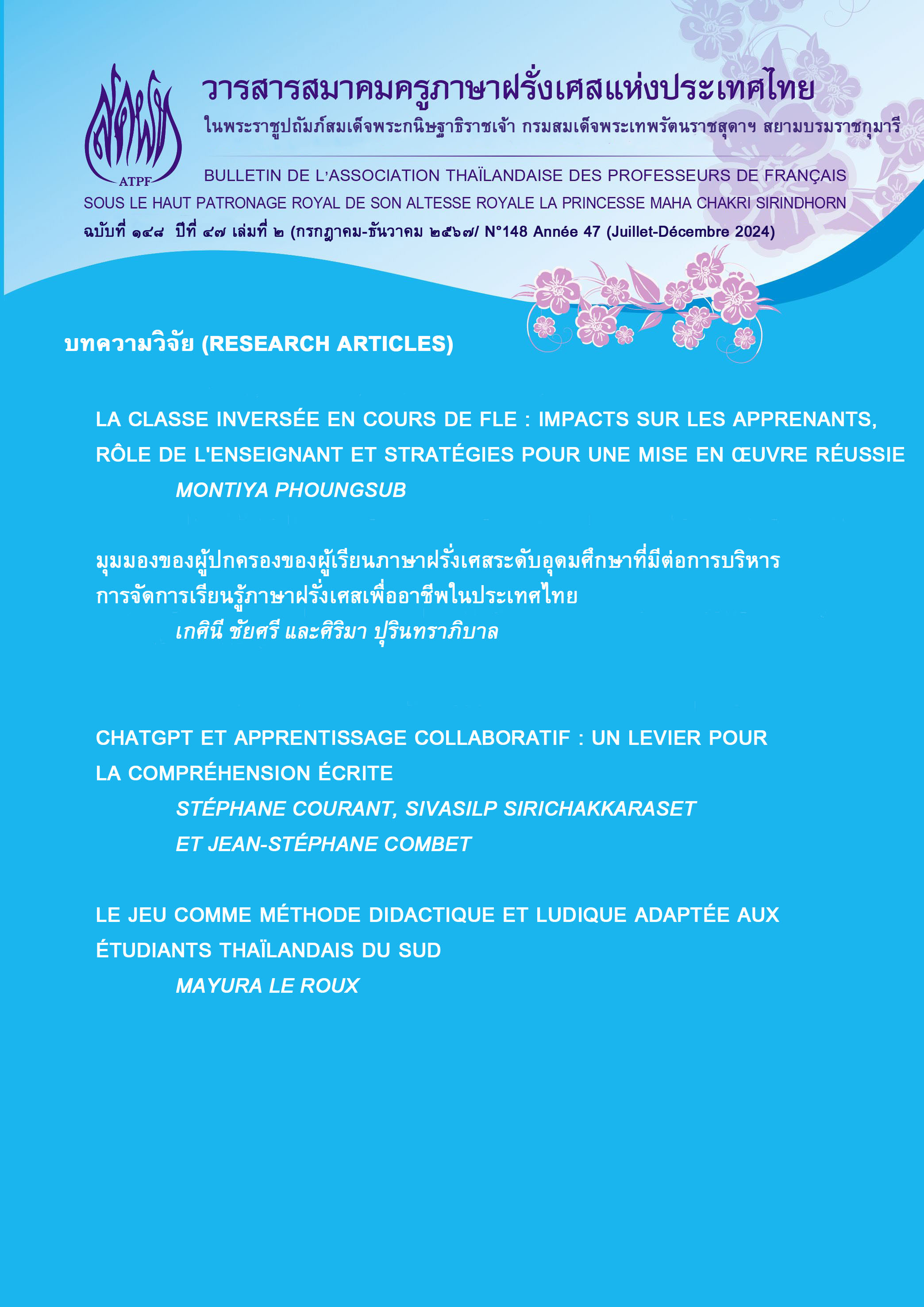Le jeu comme méthode didactique et ludique adaptée aux étudiants thaïlandais du Sud
Main Article Content
บทคัดย่อ
Depuis sa création, l’université Prince de Songkla, campus de Pattani, propose l’enseignement du français. Cependant, ces dernières années, l’établissement a souffert d’un manque de locuteurs natifs, impactant le développement des compétences orales des étudiants. Située aux côtés de Yala et Narathiwat, Pattani est marquée par des tensions culturelles, politiques et sécuritaires. Selon l’ethnologue Pierre Le Roux (1998), les communautés locales, telles que les Jawi, subissent une marginalisation et une tentative d’assimilation par l’État, ce qui alimente une méfiance envers les étrangers et complique les échanges. Ces dynamiques rendent le recrutement de professeurs natifs difficile et freinent le développement du paysage éducatif. En plus de ces défis culturels, Pattani est toujours classée en zone rouge par l’ambassade de France en 2024, avec des déplacements non essentiels fortement déconseillées selon le Ministère des Affaires étrangères. Cela limite davantage l’arrivée d’intervenants externes, notamment de professeurs natifs.
Depuis le début de son enseignement à Pattani, l’auteure a observé que ses étudiants, issus de diverses origines religieuses, mélange de Thaïs bouddhistes et musulmans, manquaient de pratique orale et de fluidité dans l’énoncé. Bien qu’ils soient passionnés par l'apprentissage du français, les étudiants trouvent le mode
d’enseignement traditionnel rébarbatif et monotone, rendant nécessaire l’adaptation des pratiques pédagogiques.
En réponse à ces défis, une approche pédagogique, ludique et interactive a été introduite, intégrant des jeux vidéo, des jeux de plateau, des jeux de mots et des charades. Cette approche a suscité la curiosité, la créativité et la motivation des étudiants, favorisant les échanges entre eux, ainsi qu’une meilleure compréhension et mémorisation de la langue. Cet article présente une étude exploratoire sur l’impact d’une pédagogie ludique dans l’enseignement du français dans un contexte multiculturel et sécuritaire. La méthodologie repose sur des observations en classe, des discussions avec les étudiants, et sur l’analyse des évaluations de fin de semestre réalisées par les étudiants. Ces évaluations fournissent des avis et retours qualitatifs sur les méthodes du cours et l’approche pédagogique choisie. Elles montrent que, bien qu’appliquée partiellement à chaque session, cette pédagogie a été perçue par les étudiants comme motivante et engageante, favorisant leur apprentissage et leur progression.
Downloads
Article Details
เอกสารอ้างอิง
Berger, G. (2015). La Ticéitude, enseignement interactif en ligne du FLE : approche didactique et méthodologique curriculaire en contexte innovant [Thèse de doctorat, Université de Franche-Comté]. HAL.
https://tel.archives-ouvertes.fr/tel-01283969
Caré, J., & Debyser, F. (1978). Jeu, langage et créativité. Les jeux dans la classe de français. Hachette FLE.
Hedouche, O. (2016). L'exploitation du ludique dans l'enseignement / apprentissage du FLE. Revue des Sciences de l'Homme et de la Société, 21, 19-34. https://www.researchgate.net/publication/339621539
Le Roux, P. (1998). To be or not to be...the cultural identity of the Jawi (Thailand). Asian Folklore Studies, 57(2), 223-255.
Ministère de l’Europe et des Affaires étrangères. (2024). Conseils aux voyageurs Thaïlande – Provinces du sud. https://www.diplomatie.gouv.fr/fr/conseils-aux-voyageurs/conseils- par-pays-destination/thailande/#securite
Schmoll, L. (2016). L’emploi des jeux dans l’enseignement des langues étrangères : du traditionnel au numérique, Sciences du jeu, 5. https://doi.org/10.4000/sdj.628
Schmoll, L. (2019). Jeux numériques et apprentissage des mathématiques. Brochure Maths Jeux Culture Express publiée à l’occasion du 20ème salon Jeux & cultures et mathématiques. CIJM. 61-66.
Silva, H. (2008). Le jeu en classe de langue. (Coll. Techniques et pratiques de classe). CLE International.
Suso-Lopez, J. (1998). Jeux communicatifs et enseignement/apprentissage des langues étrangères, Académie des sciences sociales. https://www.academia. edu/8407859
Vincent, R. (2018). Jouer aux jeux vidéo pour changer l’école ? L’expérience vidéoludique dans le système scolaire français. Sciences de l’Homme et Société. https://dumas.ccsd.cnrs.fr/dumas-01895467v1
Vincent-Lancrin, S. et al. (2020). Développer la créativité et l’esprit critique des élèves : Des actions concrètes pour l’école. Éditions OCDE. https://doi.org/10.1787/8ec65f18-fr
Weiss, F. (2002). Jouer, communiquer, apprendre. (Coll. Pratiques de classe). Hachette FLE.


